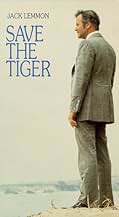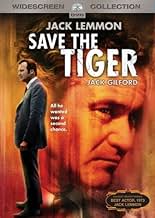This is a well-crafted movie, directed in 1973 by John G Avildsen in a conventional, theatrical manner, harking back to social dramas of 10 or 20 years before, but reflecting the more uncertain '70s in its unresolved ending.
Jack Lemmon delivers a brilliant, Oscar-winning performance as Harry Stoner, a middle-aged man at the end of his tether, who confuses his personal midlife crisis, and the failure of his fashion business, with what he sees as the USA's moral decline in the post-war years. Obsessed with the lost cameraderie of his active service in the war, with the baseball and jazz giants of yesteryear, and with the slain and fallen idols of the 60s (Kennedy, King, Monroe etc), he sleepwalks into his own moral abyss of an arson plot, comforting himself that he is no worse than the times in which he lives.
Lemmon's character is countered by those of Phil Greene, his business partner, convincingly played by Jack Gilford, and Meyer (William Hansen), the firm's veteran, expert cutter and refugee from Nazism. Phil does not suffer Harry's sense of disillusion, because he is too down-to- earth to have experienced the illusion in the first place; Meyer, also, despite superficial discontent with the changing times, gains strength from his skill and family life.
For me, the main theme here is the familiar one of the lost American Dream, and the film brings to mind the final lines of the seminal exploration of that theme, the Great Gatsby - "So we beat on, boats against the current, borne back ceaselessly into the past." Harry's American Dream is not of a golden future, but of a golden past; it isn't lost, it simply never existed. But, that said, in this movie thematic analysis definitely takes second place to appreciation of Lemmon's bravura performance.


































